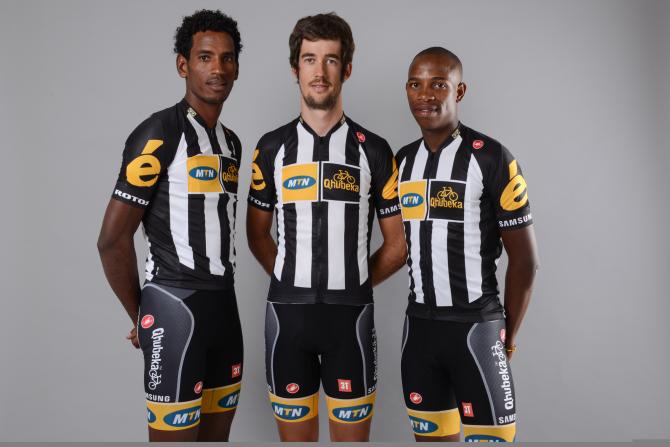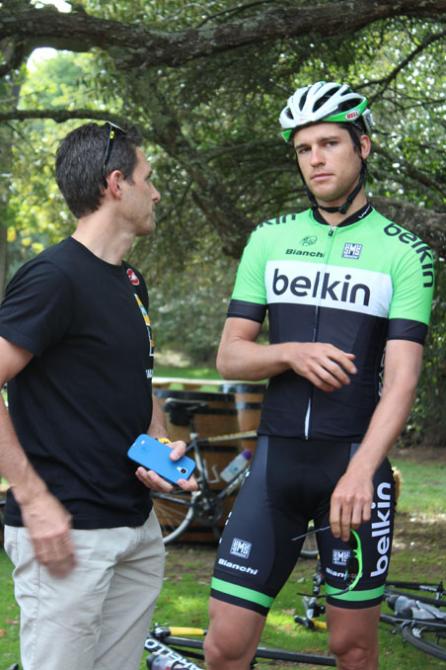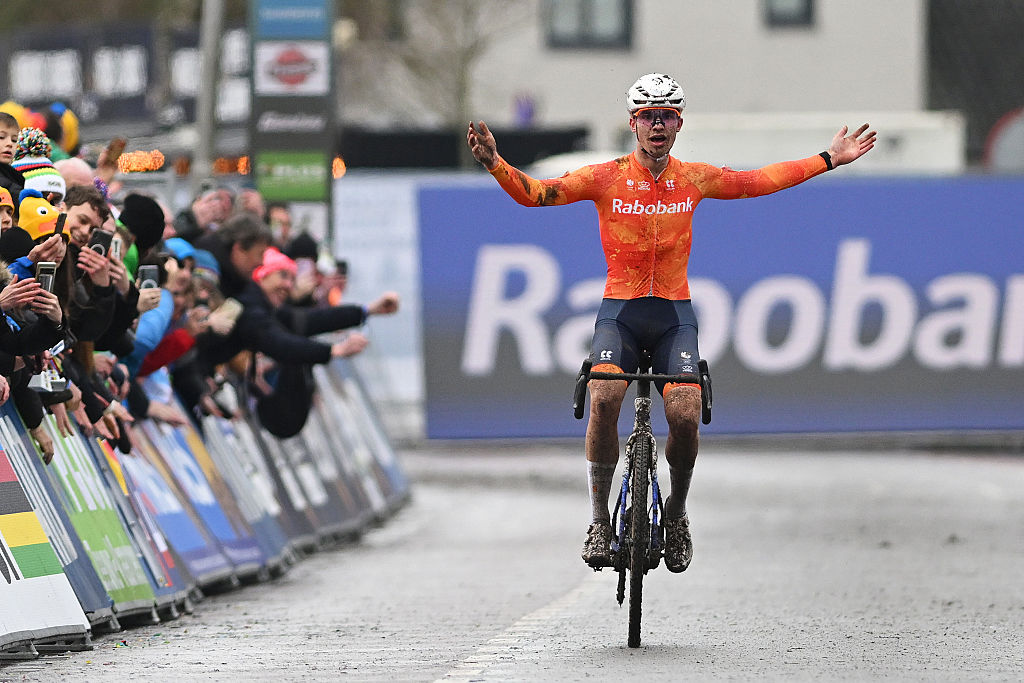Doug Ryder: MTN-Qhubeka is destined for greatness
Team boss talks plans to make history at the Tour de France


MTN-Qhubeka are looking to make history in 2015 by becoming the first African team to make it into the Tour de France. The team, which began in 2007, has been growing quickly over the last few years. They took the step up to Pro Continental level in 2013 and took part in their first Grand Tour at last year’s Vuelta a España.
To help them in their hopes of making history, the team have signed eight new riders including Edvald Boasson Hagen, Tyler Farrar and future Grand Tour rider Natnael Berhane. Cyclingnews sat down with Doug Ryder, the man behind the team, to discuss making history, putting together one of the strongest lead-out trains in the business and trying to inspire a continent.
Cyclingnews: Is 2015 a real pivotal year for the team?
Doug Ryder: We’ve thrown the kitchen sink at this year. We’ve built so incredibly over the last two years and I can’t believe that we have continued to build at this rate and the staff and riders that now want to come to our team. We must be doing something right. We’re really in a sweet spot at the moment and if our stars align then I really believe that this team is destined for great things this year.
CN: You’ve brought in eight new riders, were you worried at all about how they would connect?
DR: When we signed all these guys, there was this perception that there were so many egos that there was no chance that they were going to work together. We had lots of discussions with the riders and we spoke about what this team is about and told them to leave their egos at the door. If someone’s going to come in and think, I’m going to win this is my race and I’m not going to work for someone else then I’ve told them guys this is what you impact [referring to the Qhubeka project]. Whenever that comes to the fore, think about this because then you’ll work together like glue and paper.
CN: How did the decision come about to sign all these WorldTour riders and who made the decision in terms of the types of riders you went for?
The latest race content, interviews, features, reviews and expert buying guides, direct to your inbox!
DR: We want to build and develop the general classification riders from the African continent and to bring in a GC rider, a good one, costs so much money and we don’t have that budget. We also didn’t want to be a team that focusses on one big objective and if that fails then there goes the whole season. We need to win races to grow the brand of the team and to grow the Qhubeka charity so that we can do more for others.
The international riders are there to help us win races but also to help the younger guys. I don’t want to be a team Colombia where they can’t attract the best Colombians to their team because they don’t have the depth. Rigoberto Urán and Nairo Quintana won’t ride for Claudio Corti’s team because he doesn’t have the depth and they won’t reach their big dreams. I don’t want that to happen for our best African riders.
CN: The WorldTour riders are in the team to bring the victories to earn wildcards and help the younger riders but do you also feel a responsibility towards them too?
DR: We want them to be inspired in this team and we give them the freedom, and not the pressure that they’ve had in the past. I think that WorldTour teams are incredibly pressurised environments. We’re hoping the inspiration goes both ways.
With them mentoring the African riders they know that the African riders will give absolutely everything that they have, and inspire them with hardships that they’ve had in the past. Take Daniel Teklehaimanot. Daniel is one of 17 children and all of his brothers and sisters have defected and he’s the only one that can go back to Eritrea so he keeps the whole family together. I think that the Europeans are completely humbled by this and that will drive them onto bigger success.
CN: Does the influx of European riders dilute the team’s mission of developing African talent?
DR: We started with this team as a 70 per cent African team and we were a bit over ambitious to start with such a high number of African riders who were very young and inexperienced. We’ve only dropped that a little bit to 60 per cent, that’s 13 out of the 22 riders. It is still a significant number. We will always sign young riders from the African continent first and foremost over a young European rider to develop their talent.
CN: The Tour de France is the team’s main target, with IAM Cycling stepping up to the WorldTour is that wildcard spot a near certainty?
DR: Nothing is concrete and ASO keep their cards close to their chest and they have to. They have to be fair and transparent with every team. Do we have a good feeling? Yes we have a good feeling, especially with the performance in the Vuelta but we are not counting our chickens. We have to wait and see because everything can happen.
CN: What is possible for the team in 2015?
DR: One of the goals for the riders is the spring classics but even before that we would love to go to the Tour of Qatar and win a stage. We would love to start the season with a win. I know that Edvald Boasson Hagen is super keen on Paris-Roubaix, imagine getting top 10 in Paris-Roubaix that would be out of this world. The Tour of Flanders is also a big goal for the team with Tyler.
A really strong spring classics campaign is what we’re looking for and that will really help us to get out ticket into the Tour. Then, a stage win in the Tour de France would just be exceptional. I really hope that we will be able to get into the Tour of Spain as well. The perception is that the Pro Continental teams are not strong enough and don’t have the depth and talent to do two Grand Tours. We believe that with the depth that we have and with the talent and the race structure of the races we have the perfect balance to be able to do those races. If we went to the Vuelta then we would love to win a jersey.
CN: If the success does come in 2015 could a step up to the WorldTour in 2016 be on the cards?
DR: That’s our goal. If we can become a WorldTour team then we can give more African riders more opportunity and take them to the biggest races in the world. To have an African-registered WorldTour team where people know for sure that you’re going to be in the biggest races in the world, the fan support around the team and the confidence of our riders from that surety of knowing it isn’t a lottery will drive them to another level. That’s what we’re driving towards and let’s just hope that the first six months of 2015 are an indication that we’re ready to step up.
CN: There will be a lot of changes to the sport in 2017, what are your thoughts on that?
DR: It’s a bit iffy on whether it will happen or not. Do I think that teams should cut down their size? No, because that’s less riders with jobs. If there were more teams then I would say it is fine. I don’t think that you can reduce the number of riders without increasing the number of teams because then the pyramid just gets pointier. It just means that people move down a level and others fall off the bottom and off the bus completely. It’s so hard this sport and there’s so many riders that work so hard for others and they’re the ones that always get left off, and that’s sad.
CN: How difficult it is to balance the often dog eat dog world of professional cycling with the Qhubeka charity?
DR: Look after yourself first I guess. We don’t worry about what other teams do, we care about ourselves and the sustainability of our project. We really look after our riders and give them the surety that we don’t just replace riders because we build for time and we want to be sustainable. We love the sustainability and we want to engage with the people for the long term. It’s going to be difficult to keep our best riders because people are going to be trying to poach them but we hope that we can create the environment that is safe and secure so that they want to stay with us.
CN: How have things changed for the team in terms of the reaction you get back in Africa?
DR: As we’re getting closer to getting into the Tour de France, the interest in our team has been going to incredible heights. In South Africa the Tour de France is everything and once we get there, race it and do well, and show the potential and the talent, I think that it will open doors for other riders.
For me, that is the most important thing. We don’t want to be the only African Pro Continental team. We want to pioneer change. Could you imagine and Ethiopian team or an Algerian team or an Eritrean just to show what the potential is. We hope that the Tour de France and our involvement in that will grow and get more people into cycling.
Born in Ireland to a cycling family and later moved to the Isle of Man, so there was no surprise when I got into the sport. Studied sports journalism at university before going on to do a Masters in sports broadcast. After university I spent three months interning at Eurosport, where I covered the Tour de France. In 2012 I started at Procycling Magazine, before becoming the deputy editor of Procycling Week. I then joined Cyclingnews, in December 2013.
